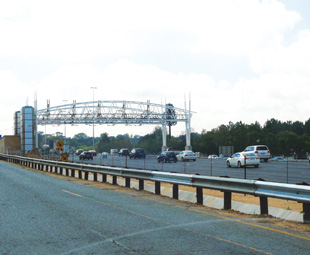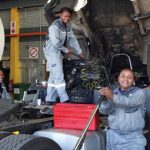Paying your way

Open-road tolling will mean a better service for those who are willing to pay for it.
People who are willing to pay the toll fees to be charged on the highways of Gauteng will get value for their money.
“Toll-road users will reach their destinations quicker and for commercial transport companies it will mean higher levels of productivity. Congestion will be alleviated further by discounts for using the toll road after hours,” says Koos Smith, engineering executive at the SA National Roads Agency (Sanral).
But this service does not come cheap, says Mike Schüssler of www.economists.co.za. Road freight companies will pay a total of about R800 million per annum in tolls.
“While we need better roads, the cost of this project must be put into the perspective of our ability to pay – some can probably pay, while others cannot afford this and therefore we will move the congestion to other roads, rather than eliminate it.”
Open-road tolling in Gauteng will collect about R230 million a month, with heavy-duty trucks paying R2 a kilometre (down from R2,97) and medium-sized trucks paying R1 a kilometre (down from R1,49). These rates have been recommended to the minister and Sanral is awaiting final approval.
According to Schüssler, the transport industry contributes approximately R12 billion to the tax coffers every year. About 32% of this is paid by the road-transport industry.
Smith says looking at the numbers in this way is to ignore the big picture.
“Transport companies will be able to operate more productively, which will translate into increased income,” he says. This, Schüssler says, could be true if all factories were situated on the highway and did not have to make use of smaller roads, where congestion will become unbearable as a result of road users trying to avoid the toll roads.
To collect the toll fees from road users will also be hugely expensive.
According to Smith, about 20% of the money collected will go towards collection fees. At other toll roads in the country, between 10% and 18% of the money collected goes towards collection fees.
There has been much debate on whether it will not be easier to collect money for roads by increasing the fuel levy.
Speaking at the Southern African Transport Conference in Pretoria recently, Jeremy Cronin, deputy minister of transport, said the national treasury is opposed to ring-fencing tax revenue because it brings about inefficiencies in government spending over time, as spending agencies are not bound by the accountability of the budget process for how effectively they apply the funds.
Building roads and maintaining them is very expensive and South Africa cannot afford to keep roads in good shape. According to Schüssler, it will cost between R180 billion and R240 billion to eradicate the roads backlog.
“We have to collect money for new roads and the maintenance of existing roads elsewhere, because government simply cannot afford it. We spend a lot of money on education and health and in South Africa we have 15 million welfare dependants, while we have only 13 million employed people,” he says.
“This will hit the consumer very hard. In South Africa we have 3,8 people for every available job. The world average is 2,25 people for every available job. This means that every working South African has 2,8 dependents. This new road toll will contribute an estimated 0,22% to inflation. A hike in inflation will affect particularly poorer households negatively, which will in turn have an impact on the economy as a whole.”
Smith agrees that government cannot afford to maintain all the country’s roads.
“It will take us 20 years to pay for these roads. In 10 years time, we will have to start spending money on maintenance. Then there will be congestion again and we will have to do something about that. And in the meantime, while we cannot collect any toll fees, the interest on the loan is killing us.”
Published by
Focus on Transport
focusmagsa




